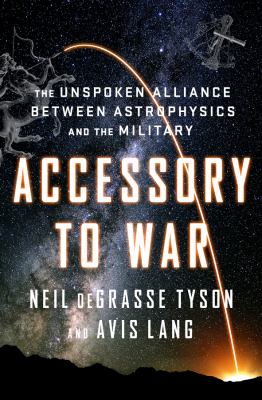Neil deGrasse Tyson and Avis Lang have written a very depressing book on how warfare and states' pursuit of dominance have become increasingly intertwined with scientific pursuits. Accessory to War: The Unspoken Alliance between Astrophysics and the Military covers developments from early modern Europe to our time. While the book is informative and well-organized, it fails to answer or even address the biggest question facing the scientific enterprise for which Dr. Tyson has become its most public advocate: why is humanity not acting on the knowledge the scientific enterprise has produced in order to create a sustainable, just human society?
In the last chapter, the authors write, "the laws of the universe transcend nationality, ethnicity, and genetic heritage." With these few blithe words, they seem to dismiss the idea that great powers are using the products of the scientific enterprise to suppress and harm the majority of humans. The authors don't address their own nation's complicity in the assassination of Iranian scientists and Palestinian medical doctors, how intellectual property regimes enforced by the industrialized nations are condemning hundreds of thousands to die in the COVID-19 pandemic, how the United States's sanctions on Cuba are hindering development, production and distribution of COVID-19 vaccines and how brain drain makes it impossible for most nations of the world to have any control over the scientific enterprise.
The authors speculate that colonization of the asteroid belt might result in ending war-causing resource scarcity on earth. Aside from the strong possibility that humanity might destroy itself before being able to harness resources from the asteroid belt, isn't it just as likely that states/corporations on earth will prevent their rivals from accessing these resources in order to maintain monopolies, just as the developed world enforces underdevelopment in other countries to prevent competition? And aren't Tyson and Lang reading or watching The Expanse series? Mining the belt isn't going to solve our problems.
Al-Siddiq Carl Sagan, years ago, made the most moving appeal I've ever heard for human solidarity with his Pale Blue Dot monologue.
Sadly, we humans haven't got the message. I don't imagine rare metals and ice on asteroids will be any more inspirational.
Tyson and Jet Propulsion Laboratory and NASA and CERN et al scientists and engineers experience the scientific enterprise as joys of discovery and a decent standard of living. Palestinians, Afghans, Somalis, Central Americans, Filipinos & Brazilians killed by the police, the poor in the USA on the edge of homelessness -- in short, huge swathes of the world -- experience the scientific enterprise as assassinations, bomb fragments, border walls, incarceration and surveillance in support of dictatorial puppet regimes which facilitate the resource extraction which supports the scientific enterprise.
Martin Luther King wrote in his 1963 book Strength to Love that we have guided missiles and misguided men. I ask Dr. Tyson and all the other techno-optimists, including the charlatans like Steven Pinker, "Are things getting better? Are they improving fast enough to avoid apocalyptic death tolls in the next 40 years? Could we be doing better, and, if so, what's stopping us? At what point would ethical scientists, mathematicians and engineers put down their instruments and say, 'Until we use what we already know to fix this ship of ours, we're not going to do anything else.'?"


No comments:
Post a Comment